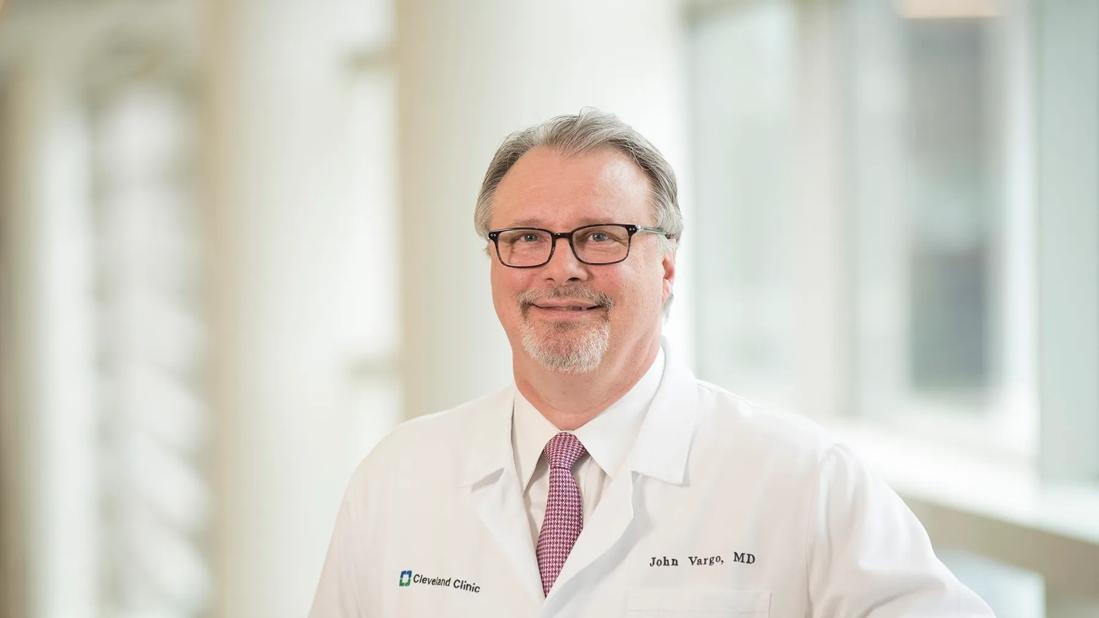ASGE’s outgoing president looks back on a busy year

Image content: This image is available to view online.
View image online (https://assets.clevelandclinic.org/transform/57e75437-bbbe-430f-8e23-ebd20efc3952/DDSI_1550108_04-23-19_031_DG-jpg)
19-DDI-210-drVargoPortrait-650×450
When John Vargo, MD, MPH, took the reins as president of the American Society for Gastroenterological Endoscopy (ASGE) in May 2019, he had several ideas on his agenda. Now, as he looks back on an exciting, productive year, he discusses how those ideas became reality and how the coronavirus spurred two unforeseen advances.
Advertisement
Cleveland Clinic is a non-profit academic medical center. Advertising on our site helps support our mission. We do not endorse non-Cleveland Clinic products or services. Policy
You made it clear that, as president of ASGE, one of your major priorities would be to evolve your educational portfolio to meet the needs of your members. Can you talk about that?
Dr. Vargo: We assess the needs our members on an ongoing basis by listening to them and reading their comments on our website. A recurring theme has been the need for improved access to educational materials. Everyone is busy and would prefer to add to their knowledge base on their own time. In response, we developed an online learning platform we call GI Leap, which stands for Learn, Explore and Advance Practice. Practitioners can go on www.ASGE.org any time 24/7 and access a portfolio of online educational and instructional videos. This fills a major need.
Of course, online instruction does not put instruments in our hands. We still need the hands-on experience we get at our training center in Chicago. In the future, however, we may see institutional partners become learning centers. This could shorten travel time and make the education more accessible.
One of your priorities has been to improve the safety of endoscopy. How were you able to expand this program through ASGE?
Dr. Vargo: A major focus is reducing infection risk to improve patient safely. We organized a state-of-the art review in December 2019 attended by leading experts from endoscopic practice, equipment development and manufacturing and the U.S. Food & Drug Administration. It provided an opportunity to view new technologies and review the challenges posed by reprocessing scopes. It appears the solution to minimizing risk may be disposable scopes or components that allow for easier cleaning.
Advertisement
As Director of Enterprise Endoscopy Operations at Cleveland Clinic, you standardized endoscopy equipment and procedures throughout the institution to ensure uniform quality of care. Were you able to translate this program to other institutions through ASGE?
Dr. Vargo: Several other health systems reached out for advice, and we’ve spoken with them. But the process is complex and detailed. I am excited to be coauthoring a book on endoscopic operations that will be published in early 2021. It will provide experience-based advice on how to build a highly functional endoscopic operations group within an institution.
How did COVID-19 impact your presidency?
Dr. Vargo: We had to cancel Digestive Disease Week, which has massive repercussions. But challenging situations like this open the door for opportunities. We have been live streaming courses for a few years, and this is our chance to take it one step further. We will be putting our DDW presentations, plenary sessions and world cup program on GI Leap.
The coronavirus also challenged us to provide targeted and timely information to ensure the health and safety of our practitioners and their patients. We were able to team up with other GI societies to disseminate key information with unprecedented speed to practicing gastroenterologists worldwide. We plan to maintain this communication process indefinitely.
What makes you proudest of your tenure as president?
Dr. Vargo: Having the opportunity to work with phenomenally talented people to make a difference in lives of patients and professionals.
Advertisement
Advertisement
Patients report improved sense of smell and taste
Clinicians who are accustomed to uncertainty can do well by patients
Unique skin changes can occur after infection or vaccine
Cleveland Clinic analysis suggests that obtaining care for the virus might reveal a previously undiagnosed condition
As the pandemic evolves, rheumatologists must continue to be mindful of most vulnerable patients
Early results suggest positive outcomes from COVID-19 PrEP treatment
Could the virus have caused the condition or triggered previously undiagnosed disease?
Five categories of cutaneous abnormalities are associated with COVID-19